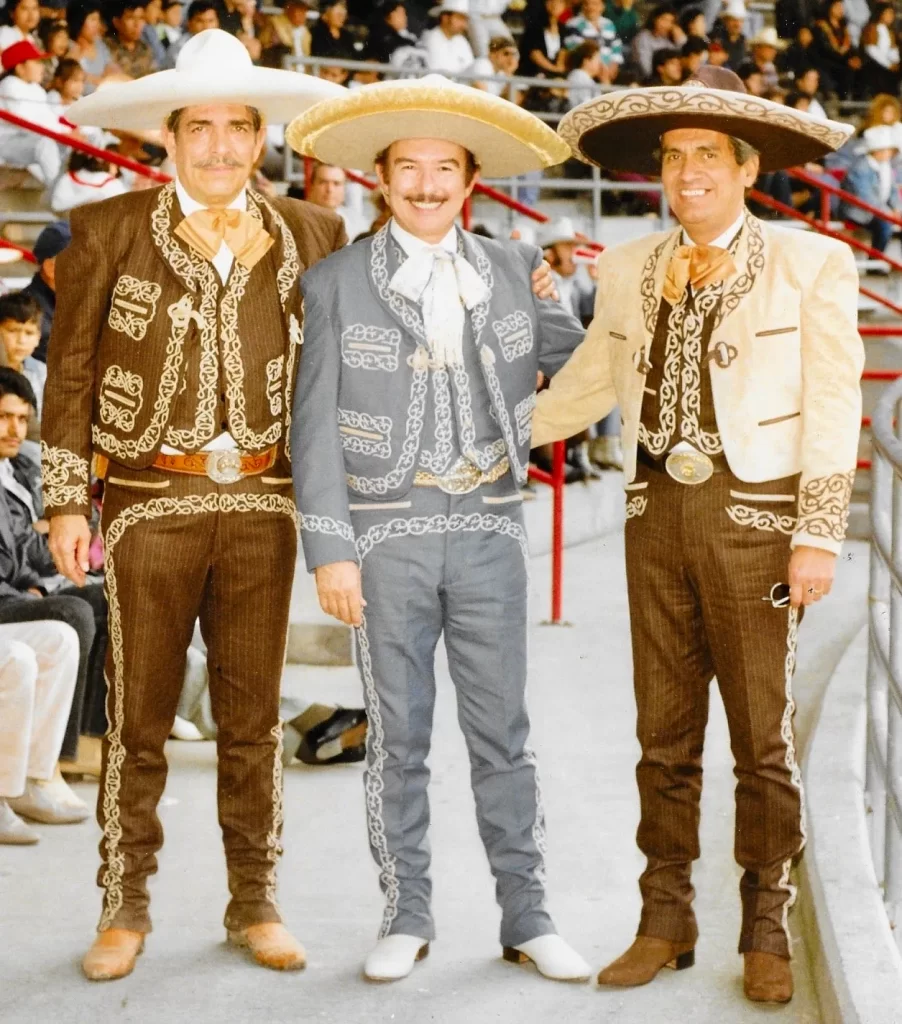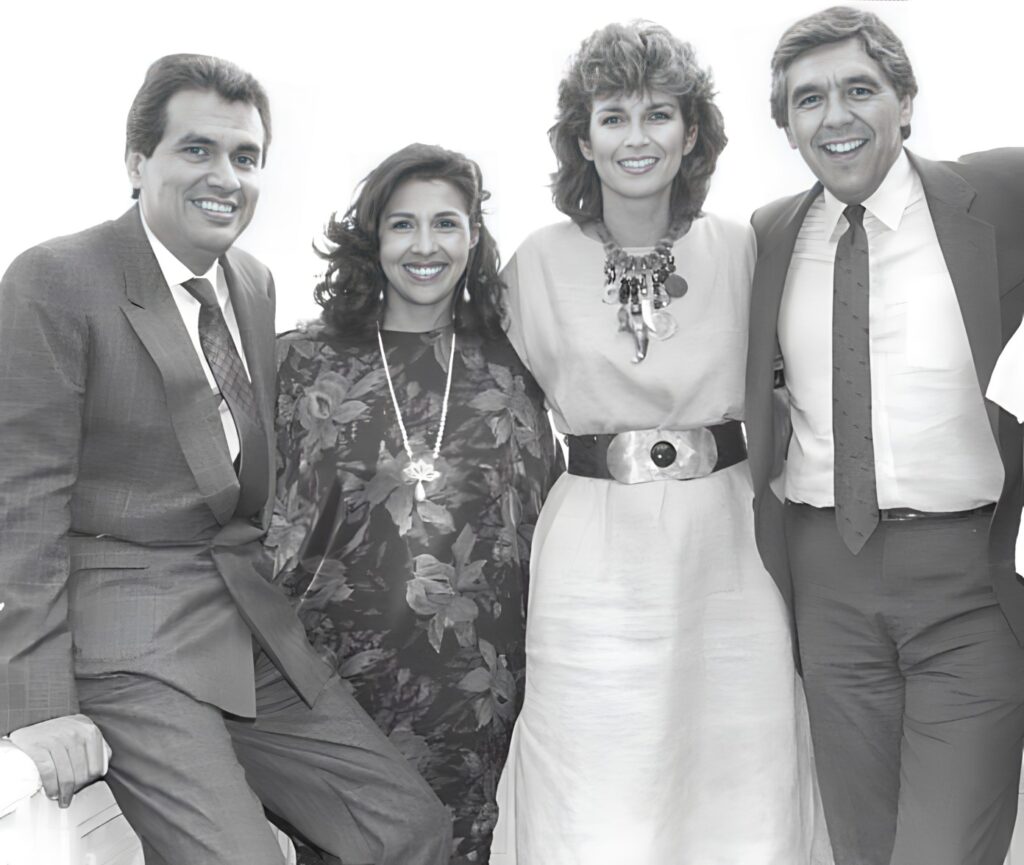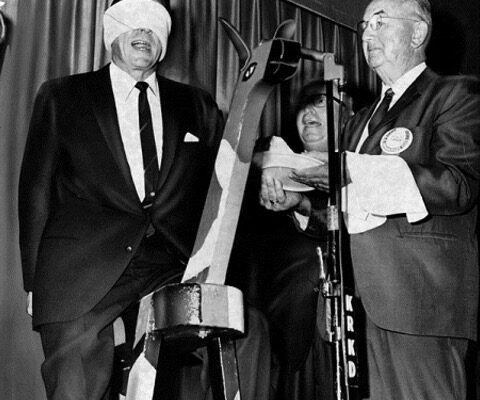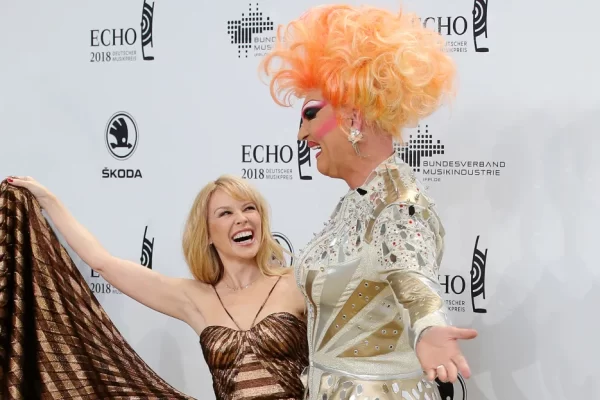The Richard Alatorre I knew, the Richard Alatorre who said he had to change the world — and to a great degree, he did just that… that Richard Alatorre dramatically altered the political landscape for Latinos in California and ultimately became The Godfather of Latino Politics.
By TONY CASTRO
September 14, 2023
IT IS MEXICAN INDEPENDENCE DAY IN a couple of days. El dieciséis de septiembre, or the Sixteenth of September, marking the beginning of Mexican independence from Spain, its ruler since 1521. The 16th is the day that New Spain — which would become Mexico on Sept. 27, 1821, after 11 years of constant battle — declared independence from Old Spain in 1810.
Celebrations abound every year, and this one is no different. The Mexican American group behind the annual East Los Angeles Mexican, Independence Day parade is honoring the late great Latina political trailblazer, Gloria Molina, who passed away earlier this year. And well it should.

But with all due respect, I am honoring a different Latino political power figure on this Mexican Independence anniversary. Raise a toast, my friends, to one Richard Alatorre.
It has been almost seven weeks ago that I received a message from an acquaintance informing me that Richard was near death, hospitalized in an intensive care unit after suffering more than one cardiac arrest, and unlikely to make it through the weekend.
In my life, I have had any number of disturbing telephone calls, letters and emails. But this may have been the most disturbing of all. I was no more ready for Richard Alatorre to leave the world that I am about my own life ending. And I fretted about what I would read about my friend over the coming days if this were true. I could already imagine the obituary in the Los Angeles Times, which never gave a damn about Alatorre when he was at the height of his career, and seems to still delight in his troubles, towards the end of his public life.
There is no denying that Alatorre, the former state assemblyman and City Councilman, who represented the 14th district of the city’s Eastside and Northeast made almost as big a mess of his political career as the numerous enemies he collected during his life. And there indeed undeniably was a celebration among his foes when his mistakes brought the powers of local prosecutors and then the federal government down upon him.
He gave up his council seat and did what he had to, to avoid any kind of prison sentence, eventually just retiring to his family’s home in his old City Council district.
But that was not the Richard Alatorre I knew, the Richard Alatorre who said he had to change the world, and to a great degree, he did just that. The Latino power celebrated today in recognizing Gloria Molina or any of the other California Latino politicians now in office possibly might not have happened — or happened as quickly as they did — if it had not been for Richard Alatorre.
The Godfather of Latino Politics. That’s what he came to be known. And for good reason.
The Richard Alatorre who survived this midsummer health scare and continues his recovery would never agree with that description of himself, though it’s true. Quite simply, Alatorre changed how the non-Latino world in California viewed Latino politicians. He is the politico who altered Latino politics from the image of an overly humble, sleepy Eastside hat-in-hand public servant to an almost swashbuckling, churlish, no holds barred powerbroker too bold, too brash, and too unmindful of old-style civilities. Put in Hollywood terms, he turned the image of Latino politicians from the embarrassingly silly José Jimenez to Johnny Depp’s iconic Captain Jack Sparrow.
“I am not the apostle,” he said to me once, trying to beg off the power broker label I had pinned on him in a 1981 column in the Los Angeles Herald Examiner. “You give me too much credit.”
Did I? Alatorre had just redrawn California’s congressional and legislative redistricting maps carving out a historic new number of largely Latino districts in the Los Angeles Eastside and San Gabriel Valley, that at the time almost quadrupled the number of Latino elected officials in the Golden State.
During that time, Alatorre had arguably become the third most influential politician in the state, behind only Governor Jerry Brown and Assembly Speaker Willie Brown. It had been Willie Brown, who upon ousting his predecessor from his longtime Assembly leadership position, gave his pal and legislative partner Alatorre the choicest plum of all legislative committee chairmanships — as head of the redistricting committee redrawing the Golden State’s congressional and legislative maps after the 1980 census.
Latino politicians in California were suddenly in awe of what he had done. There was incredible respect shown to him anytime he was around, short of kissing a symbolic ring on his finger. Even the aging Edward Roybal, who in 1949 had become the first Latino elected to the City Council and then in 1962 the first Latino elected to Congress from California, begrudgingly told me: “Richard was born under a lucky star. How he has been able to do some of the things he’s done, well, yeah, I have to take my hat off. Only a riverboat gambler could pull off some of these things. Who knew he had this kind of pluck or luck?”
Four decades later, the impact Richard Alatorre made on California has been forgotten by many and not known to even more. But his contributions remain as part of a legacy that will likely take biographers and historians decades longer to unravel and explain. It is a legacy shrouded by time and by his own undoing and misbehavior in his later public life. Alatorre was a complex man, and his career and public life were equally convoluted and entangled.
What was the controversial Alatorre’s role in shaping the history of Latinos in the 20th century: Was Richard Alatorre — for so long considered an iconic realist by friends and defenders — a misunderstood idealist who went about trying to right society’s wrongs with an unnecessary penchant at times for tough, profane talk and a weakness for booze, cocaine, and doing stupid favors for influential friends who used him to make themselves richer? Or is Alatorre, idealist or not, worthy of the continued praise that gets heaped on him in certain political and social circles? Is he best characterized as the godfather of Latino politics, capable of making smart sacrifices for the greater good? Or was he a careless and callous leader, responsible for perpetuating political corruption to the detriment of the image of Latinos everywhere? Was Alatorre simply a vastly overrated politician — no more original in his ideas than any other post-World War II political figure? And, ultimately, was he a force for good — or for bad? Well, what was it he said about himself in his ponderous 456-page 2016 autobiography, Change From the Inside, a book that one well-regarded critic described as “nearly worthless as scholarship?
“I’m always the bad Mexican.”
The Bad Mexican. Yeah, Richard. What a great subtitle to a better book about you or an epitaph on your gravestone. I know, but you know that, in almost half a century of talking to, interviewing him, and dealing with Richard Alatorre, I can’t recall of a single instance in which he ever referred to himself as a Mexican or a Mexican American, or a Chicano. He did use those words, of course, in talking about issues and society. But not once did I hear him call himself by any ethnic term. And we had dozens if not hundreds of conversations about numerous things, political and personal.
Or do you want to ask me what so many of his critics do: should Richard Alatorre have any legacy beyond being the guy who was caught using cocaine by a family court judge? Yet that told me more about Alatorre than any good he ever accomplished as a legislator or a politician. He was humbled and guilt-torn beyond anyone’s imagination about the legal battle that had won him custody of his third wife’s niece after her mother’s death and which ultimately had been at the heart of how his political career unraveled into disgrace.
It also showed me that, at his best, Alatorre was not driven by ego alone. His generation assumed that political activism had the power to make a difference. This was at the heart of Bobby Kennedy’s 1968 campaign, after all, revised and updated by Barack Obama in 2008. But what lasting change did either of those two quixotic, egalitarian campaigns accomplish? We fell in love with the romance of change and the way revolutions always tantalize our dreams of a perfect world. We were going to change the world. To his detriment, Richard Alatorre may have abused the privilege, but his career is a valuable reminder of that now anachronistic belief.

Bill Orozco Photo
But the Bad Mexican self-rap was a chip on his shoulder that he carried through life and politics, not unlike in the motivations that so many others have used in sports, business, and in the political world. It served him well, especially in fending off criticism from reporters, who generally didn’t care for Alatorre, the way he carried himself, the way he behaved, and especially the way he treated most of them. Has anyone in California public life ever, for so long, attracted so much adulation from his defenders while earning so much censure for his personal gestures and attitudes?
Why was it that seemingly for much of his time, Alatorre’s personal life was a mess. Though he quietly committed countless acts of kindness and generosity, he also railed at many newsmen, the very people with the power on how he would be portrayed to the public. He made no secret that he was not a family man, though he portrayed an entirely different image in his third marriage, with the adoption of his niece and while his political and professional life were falling apart as his criminal troubles took him to the brink of going to prison.
But in 1985, as he was preparing to transition from being a powerful figure in the legislature to a new freshman city councilman in Los Angeles, domesticity wasn’t even in Alatorre’s language. That summer, I remember rushing to a lunch with Richard at his favorite Chinatown restaurant, and Alatorre pointing out that I looked like a fashion plate with exception of some paint along my right temple. I had been repainting the nursery we were preparing for the baby my wife and I were expecting in September.
“What? You’re starting a family already?” He had been a guest at our wedding the previous summer. “I hope you’re ready for that. I couldn’t handle it. The diaper changes and all that shit. I told (his first wife), ‘You wanted kids. You handle it.”
“You never changed any of your kids’ diapers?” I couldn’t believe it.
“Nah, not one,” he said. “That’s not what I do.”
Somewhere in those seven years since I had relocated to Los Angeles, I had also lost track of the second marriage. She was a blonde beauty, who looked like she belonged in Hollywood on the silver screen, and not in Sacramento as a legislator’s wife. And it was only at this lunch that I learned that this marriage had ended.
“This surprises you?” He asked.
“Yeah, I guess it does,” I said. “She seemed like a keeper.”
And then we got into a talk I wasn’t prepared for, having come to this lunch to talk to Richard about his dreams as a city councilman. Was he about to lay the groundwork to run for mayor?
But Richard wanted to talk about marriage, and in particular being married as a Latino man to an Anglo woman, as Richard’s second wife had been, as well as my wife.
“I don’t know, man,” he said. “Are we doing the right thing? I mean, the women you date, you get on with someone, you fall in love, but you’re Hispanic, and she’s white. I mean, man, do you ever feel like you cross the line you shouldn’t have? I mean, there’s a whole sociological discussion going on over this.”
“I know, I took part in a study that the University of Texas did on Latino-non-Latino marriages,” I said. “Look there is always going to be pros and cons on this as there is on everything else. What’s that great John Lennon line? Let them think what they want to think. They will, anyway, won’t they?”
“Yeah, but man, this is us,” he said. “This is real life we’re talking about.”
“Well, Richard, maybe you’re having lunch with the wrong journalist,” I said. “Maybe you should be having lunch with your good pal, Frank Del Olmo, who, for as long as I’ve known him, has been uptight about this whole question through at least two marriages.”
That lightened the mood significantly. Alatorre and Del Olmo, an editorial writer and occasional columnist at the Los Angeles Times, had never been on the best of terms. In fact, they couldn’t stomach one another.
As for me, I’d met Richard Alatorre on one of the worst days of our young lives. June 4, 1968. He was 25. I was 21. He was a graduate student at the University of Southern California, helping direct an organized labor get-out-the-vote drive for Senator Robert F Kennedy in the California presidential primary. I was an undergraduate at Baylor University in Texas, working on another part of that same get-out-the-vote drive for my old man’s compadre and World War II army buddy, Pancho Medrano.
Pancho was a national organizer for the United Auto Workers and had been with the Kennedy campaign since March, just days after Bobby had entered the race. I had joined Pancho in Texas, which didn’t have a presidential primary but instead presidential caucuses at the precinct level. So there our job wasn’t getting out the vote but getting people out to attend their precinct caucuses, which were held minutes after the polls in the local and state primaries had closed. It was only at those caucuses that voters could participate in the selection of the presidential nominee. But it was Texas.
How can I say this? And I am a Texan. But I am also a Tejano. And the game seemed rigged. But in California, it was a different story. And there’s no drama today about what happened in the 1968 California presidential primary. You know how it ended. Badly. Working on the campaign is that like gambling at a casino in Vegas. There are no clocks. You don’t know what time it is. You’re not even sure what day it happens to be, except when it’s election day.
And that day had been long and then, after the shooting, it was as if, that long day and night would never end. About 12 hours before Kennedy was shot in the kitchen pantry of the Ambassador Hotel, I had been at some hole in the wall in Boyle Heights, passing out lunches and sodas to volunteers on lunch breaks. It was there that Richard later insisted we met. He knew Pancho by name and labor affiliation because of Medrano’s long association assisting the United Farm Workers in their organizing and strikes.
In 1971, when we met again while Alatorre was running for the California State Assembly in a special election, I couldn’t place the face, but I remembered the name, though it may have been the late California labor activist Soledad Alatorre I confused him with. A part of me suspected he made up our past having crossed in the Kennedy campaign, because no one I knew from that time remembered him. It may have also been the garrulous side of Alatorre, simply wanting to make a useful connection.
By then, I was a young reporter at the Dallas Morning News. I was reporting on politics and civil rights, and I had written a long 4,000-word feature about Pancho and his work with Cesar Chavez and the UFW, as well as his political work with Kennedy and other campaigns. He had suggested I join him on this latest trip to Los Angeles not because of Alatorre who was running as a Democrat, but because of a third-party candidate from the Chicano movement’s Raza Unida Party.
La Raza Unida party, which had formed in several southwestern states, became the champion political organization of the activists and students — and would have one major moment of glory in Los Angeles.
In 1971, a California Assembly seat opened in a special election in northeast Los Angeles and caught the eye of Alatorre, by then a political aide to Assemblyman Walter Karabian, who had the claim of having been the youngest legislator in state history and the party’s majority leader in the State Assembly.
“When you talk about who truly got the Chicano political movement on its way, you have to say it was Wally Karabian,” said Louis F. Moret, who later became one of the most influential behind-the-scenes movers and shakers among Hispanic politicians. “You have to be on the inside to know and understand how real politics works. How you organize. How you get out the vote. How you get elected. How you network and collect IOUs and how and when you cash them in.
“Well, we, Latinos didn’t really have anyone learning the ropes of the inside until Wally hired Richard.”
But Alatorre’s first run at public office became a disaster. The third-party Raza Unida candidate jumped into the race, took away Democratic Latino votes from Alatorre that it allowed a Republican candidate to win the Assembly seat.
“I learned a costly lesson,” Alatorre later recalled. “I was out-Hispanicked in my own backyard. It wouldn’t happen again.”
Alatorre won the Assembly seat in the regular election year in 1972. He became the first Hispanic since Roybal elected to any kind of office from a political district entirely within the city of Los Angeles.
“When I first ran for public office, Tom Bradley ran for mayor, trying to become the city’s first African American mayor,” said Alatorre. “He lost in what was an ugly, racist campaign directed at him. Four years later, he ran and won, and I remember thinking that Los Angeles was changing.”
But not changing quickly enough. In the next decade ahead, though, Alatorre sped up the clock, to the point that I began calling the political machine he had built on the Los Angeles Eastside The Golden Palominos. That was how I christened them in a column in the Herald Examiner. I didn’t think much of it until a few days later when I called Alatorre’s Sacramento office. It was around noon, and a receptionist said she would check to see if Richard was available to take my call. A few minutes later she returned to the line, and I thought I could hear her holding back a laugh as she said: “The assemblyman asked if he could return your call in half an hour. He said to tell you that the palomino is grazing.”
At first I thought I’d misheard her.
“Miss,” I said. “Did you say, ‘the palomino is grazing’?”
“Yes.” She was barely able to contain some giggles. “He said to tell you that word-for-word exactly.”
Aha! Soon, though, The Golden Palominos became a term in common use by those very Latino politicians themselves. Many of them called my newspaper asking for extra copies of my Golden Palominos column issue. One of them, I understand, even had special T-shirts made. Mind you, at the time this clique was a boys’ only club. There were no women in the group, and no Mexican American women held elective office in Los Angeles or in the California state government. It would prove to be an exclusionary mistake. The Chicano movement itself, after all, had been a civil rights activism borne out of machismo, with mostly men in leadership roles. For good or bad, machismo was in the culture.

Bill Orozco photo
Remember. The heroes of the Mexican Revolution in the history and stories down through the years had been Porfirio Díaz, Pancho Villa, Francisco Madero, Álvaro Obregón, Victoriano Huerta, Venustiano Carranza. It didn’t make it right. It was what it was. Even in modern times the most notable Latino hero was Che Guevara, the Argentine rebel who had aided Fidel Castro in the Cuban revolution and became a pop culture icon. Was it any wonder that in the largely Latino Los Angeles Eastside, the hypnotic eyes of a revolutionary with flowing long hair and a Che Guevara look beamed like headlights through a morning fog from the wall of a housing project along East Olympic Boulevard with a simple message of the changing times:
“We Are Not a Minority.”
Neither were Chicanas, and no one likely knew that better than Gloria Molina.
I still remember the afternoon I first met her. I had just finished interviewing Willie Brown. But throughout the interview with the new Speaker of the State Assembly, I couldn’t help but sense that I was being critically studied by a young Latina in a women’s power business suit standing nearby. We were on the Cal State Los Angeles campus, and I assumed she was a professor as she was holding a briefcase and seemed to be waiting to speak to Brown. It turned out she wanted to introduce herself to me. She was an aide to the Speaker, and she reminded me that Assemblyman Art Torres and his wife had wanted us to meet.
“Art says you may be the most influential Latina in California,” I said.
“I think he says that because I round up the women to get him elected,” she said. Her confidence was unmistakable.
“That’s what I’ve heard,” I said, “though I wonder if maybe you shouldn’t round them up to get yourself elected.”
After all, there were no Latinas in elected offices in the Assembly, the State Senate, the Los Angeles City Council, or almost anywhere else in California.
Gloria looked at me as if not sure whether to believe me.
“You really think so?” I couldn’t tell if her question was just rhetorical. “But no one outside our group of women knows who I am.”
A few weeks later, Gloria Molina, a Latina she said no one knew her beyond her family and friends, was on the front page of the Los Angeles Herald Examiner, the news peg for a series of stories on Chicana power called “Machisma.” The stories were picked up by the Associated Press and translated and republished in Los Angeles Spanish daily La Opinión. Local television and radio reporters followed up. In a matter of days, Molina was the second most famous Latina in the state, behind only Dolores Huerta of the United Farm Workers union.
The only ones who didn’t seem impressed were the Golden Palominos who were about to commit political suicide. Molina seemed hellbent on of running for the Assembly seat being vacated by Art Torres who was hoping to move up to the State Senate. She had Torres’ blessing But the endorsement she needed was that of the head of the Eastside political machine, Assemblyman Richard Alatorre.
Alatorre’s Sacramento office was in a state of disarray. He was in the midst of moving to larger quarters in the east wing of the Capitol, and so his office was littered with packing boxes filled with a decade’s worth of business as an Assemblyman. But now he was arguably the second most powerful person in the Assembly. And so the disarray in Office 2188 on this cold, overcast day in late 1981 was not only physical but also political. For going on inside Alatorre’s quarters was the secret power-brokering of the political spoils in the Mexican American Eastside of Los Angeles.
Unfortunately, Molina didn’t get Alatorre’s endorsement in the 56th Assembly District race she was eyeing, but neither did anyone else. She was disappointed, though she took consolation in knowing that she would not be running against a candidate openly supported by the Alatorre machine.
“I had worked with him for years, so I trusted him,” Molina recalled in an interview. “I had an awful lot of confidence in him and felt that he was somebody I could talk to. It started out that, ‘I’m thinking of running for the seat. What do you think?’
“And it was the way he responded that was the most disappointing, and I’ll never forget that. All that self-doubt? He threw it all back at me. ’You can’t run. You can’t win. What are you talking about? You can’t raise money. You can’t get endorsements.’ I mean, all the ‘You can’ts’ that I said to myself, he just laid it all out there for me. And I said, ‘But, of course, I could try. I think I can raise… I think I can do it.’ All this doubt. It was a very, very hard meeting, but I had already settled these things for myself. And then he had turned around and just threw it all back at me and said, ‘You can’t.’”
Years later, when I reminded Richard about this meeting with Gloria Molina, he smiled and shook his head. He knew he had screwed it up. But I thought I would reinforce the memory by telling him about the then new film Once Upon a Time in Mexico and a powerful scene in which the actor Johnny Depp delivers a prophetic line that perhaps should be asked of every Mexican and Mexican American:
“Are you a MexiCAN or are you a MexiCAN’T?”
Alatorre laughed, nodded, then lifted his bottle of Tecáte and offered a toast fitting for Mexican Independence Day as well.
“To all MexiCANS!”
Tony Castro, the former award winning Los Angeles columnist and author of CHICANO POWER (E.P. Dutton, 1974), is a writer-at-large with LAMonthly.org. CHICANO POWER will be republished in a 50th anniversary edition in 2024. He can be reached at tony@tonycastro.com.

CHICANO POWER 50 Years Reflections is a series of stories critically re-examining the Latino civil rights history of the more than five decades since the advent of the Chicano Movement in Southern California and the LA County Sheriff’s deputy shooting death of famed Los Angeles Times columnist Ruben Salazar, which underscored the very social, economic and political inequities and discrimination against Latinos that he railed against in his writing.
In this five-part series, journalist and author Tony Castro offers a powerful interpretation the Chicano Movement from today’s perspective and writes movingly about Latinos continuing their faithful pursuit of the American Dream: their progress amid broken promises and ongoing challenges faced by Latinos in all aspects of life, but especially in politics and in following in Salazar’s footsteps.
In 1978 Castro, author of the civil rights history Chicano Power: The Emergence of Mexican America (Dutton, 1974), succeeded Salazar as the leading Chicano voice in Los Angeles — a city of almost four million of which more than half are Latino — writing a three-times-a-week column for celebrated editor Jim Bellows‘ Los Angeles Herald Examiner and quickly becoming an influential community figure. (Publishers Weekly acclaimed Chicano Power as “brilliant… a valuable contribution to the understanding of our time.”)
In these stories of deep reflection and mesmerizing storytelling, Castro invites readers into the world of Latinos — his world — chronicling the experiences about race, culture, identity, and belonging that have shaped those who led the Chicano movement campaign for human rights and social justice. As much as this story is about adversity, it is also about tremendous resilience. And Castro pulls back the curtain and opens up about his career and personal life — and his struggles balancing himself in a society discriminating against so many like him, and his journey toward open heartedness.
Castro, a Nieman Fellow at Harvard, was a Headliners Club–winning journalist for his reporting on the Latino civil rights movement in the Southwest for the Washington Post, the Dallas Morning News, and the Dallas PBS affiliate KERA’s Peabody Award winning show Newsroom created by the late Jim Lehrer. While a Nieman Fellow, Castro lectured on the Chicano Movement at Harvard’s JFK Institute of Politics and taught one of the first college courses in America on Chicano Studies,
Castro was among the first reporters in America to write extensively about race in presidential politics, as far back as his undergraduate days at Baylor when he reported on Bobby Kennedy’s quixotic 1968 campaign in the Mexican Americans barrios of California, which became a centerpiece of his book Chicano Power.
Castro reported on the civil wars in El Salvador and Nicaragua in both English and Spanish for the Los Angeles Herald Examiner and La Opinión de Los Angeles.





